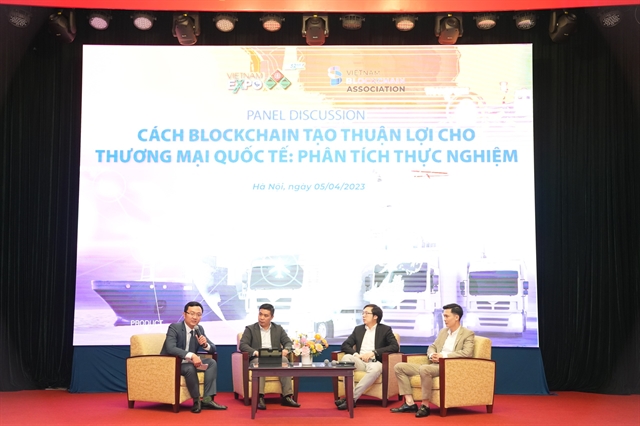Cross-border trade has become more vibrant than ever with the growth of the Internet and the technology sector in general. Experts all agree that technology contributes to bridging the gap.

Blockchain, which helps store information transparently between parties and can’t be faked, is considered an effective tool for the development of international trade as well as the digital economy.
Hoang Van Huay, Chairman of Viet Nam Blockchain Association (VBA) made the statement at a conference on “Blockchain Technology: Initiating the International Trade Process” held in Ha Noi on Wednesday.
Cross-border trade has become more vibrant than ever with the growth of the Internet and the technology sector in general. Experts all agree that technology contributes to bridging the gap. However, it brings new difficulties in the process of communication, data storage, dealing with paperwork, contradictions in setting standards and consensus on trade policy among countries.
The World Trade Organisation (WTO) on the same day released a report forecasting that the global merchandise trade volume this year will fall to 1.7 per cent, lower than that of 2.7 per cent in 2022 due to heavily influenced by fluctuations related to rising energy prices, inflation and monetary policy. Therefore, businesses need to consider cutting costs for cross-border trade at this time.
Huay added that blockchain technology emerged and is expected to solve the complexities of international trade. The WTO argues that blockchain could be revolutionary for global trade. Specifically, blockchain has the ability to cut trade costs by automating manual processes in management, encrypting foreign trade documents and letters of credit (L/C), speeding up payment operations, and automatically executing agreements through the help of smart contracts stored on the blockchain.
Do Ngoc Minh, a member of the VBA’s Technology Department said: “We are facing challenges when user data is overused by platforms acting as third parties, taking advantage of serving users and providing fake information. Blockchain is the foundation platform to help form a digital society, where everyone can participate, contribute, collaborate and transact, forming a digital economy without having to worry about the safety and integrity of the system.”
Minh said blockchain helps create new concepts such as smart contracts, Central Bank Digital Currency (CBDC), the token economy with non-fungible tokens (NFTs), metaverse, Decentralised Finance (Defi), Decentralised Autonomous Organisation (DAOs). Although blockchain is witnessing trial and error as well as success and failure, it has been playing a role in global governments, organisations and commerce.
According to a forecast by MarketsandMarkets, the blockchain-related market in Viet Nam could reach a value of nearly US$2.5 billion by 2026, an increase of five times compared to 2021.
Many organisations have realised the role of blockchain in commercial activities and start to apply it.
Nguyen Quang Thong, Director of Digital Banking at Nam A Bank said that risk management at banks often consumes a huge amount of money. In particular, with trade finance documents related to documents of origin, it is required to ensure reliability. Blockchain could be used to ensure transparent operations, reducing customer verification time and costs.
In addition, traditional international payment activities are still going through the Society for Worldwide Interbank Financial Telecommunication (Swift). However, the centralised processing through this network still has problems related to speed, operating costs, and ensuring accurate and safe transfer orders. The development of blockchain technology could form payment networks that make cross-border money transfers faster and safer.
"We hope to have support from the Government and technology organisations to promote cross-border commercial payment platforms,” Thong said.
Explaining the reason that making the Vietnamese blockchain platforms have not been popular, Eric Hung Nguyen, CEO cum Co-Founder at Spores Network (the ecosystem that supports blockchain projects) said that the legal gap makes attracting investment into Vietnamese blockchain projects facing difficulties.
“I have worked with a lot of foreign investors, but when talking about blockchain projects in Viet Nam, they were afraid that the lack of a legal framework may affect the projects’ operation. For example, blockchain can be used in L/C transactions at banks, but if the law does not recognise it, it has no value,” Hung told the conference organised under the 32nd Viet Nam International Exhibition (Vietnam Expo) opening in Ha Noi from April 5-8.
"Instead of choosing familiar topics such as Viet Nam's development and integration, sharing success, Vietnam Expo 2023 will offer practical applications and solutions to commercial operations for businesses," said Nguyen Thu Hong, Deputy Director of VINEXAD – the VietNam Expo 2023’s organiser.
"In addition to showcasing products and services and sharing from domestic and international businesses at the event, blockchain technology is prioritised to exploit its potential while being the optimal technology in the digitalisation process of the trade sector.”
VBA is currently acting as a bridge between businesses in the industry and regulators, especially international connections with a range of activities, starting with The Connect event in Thailand on March 15. — VNS





